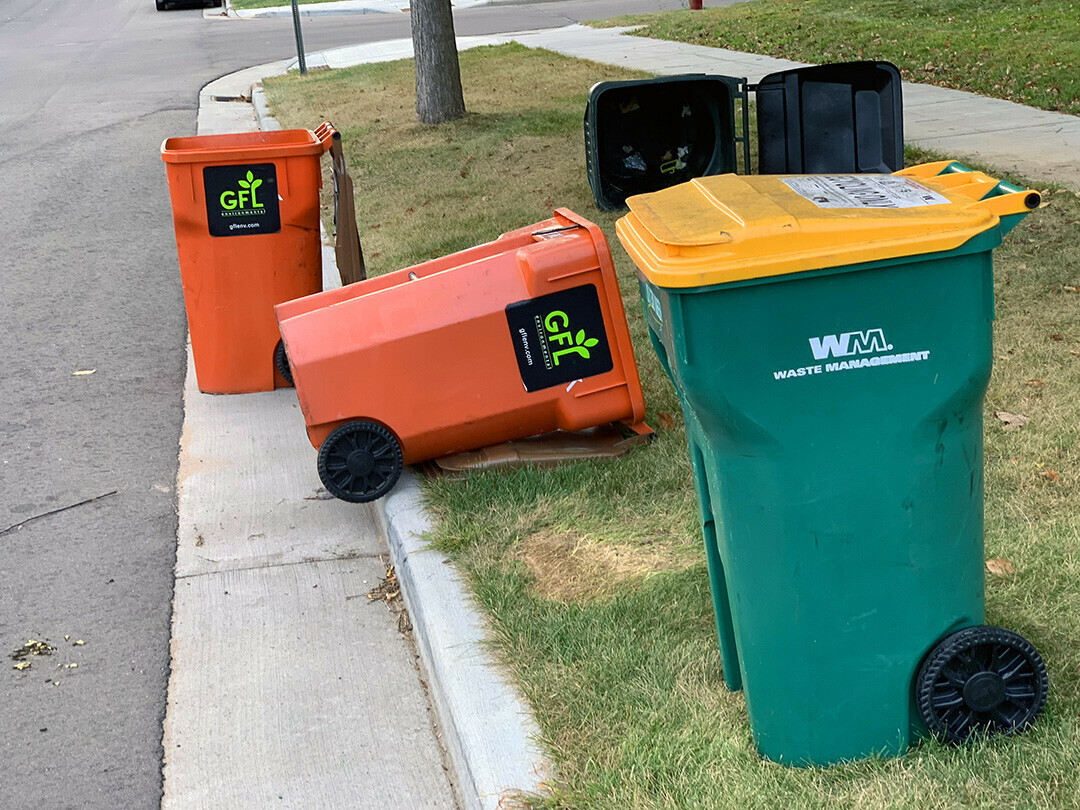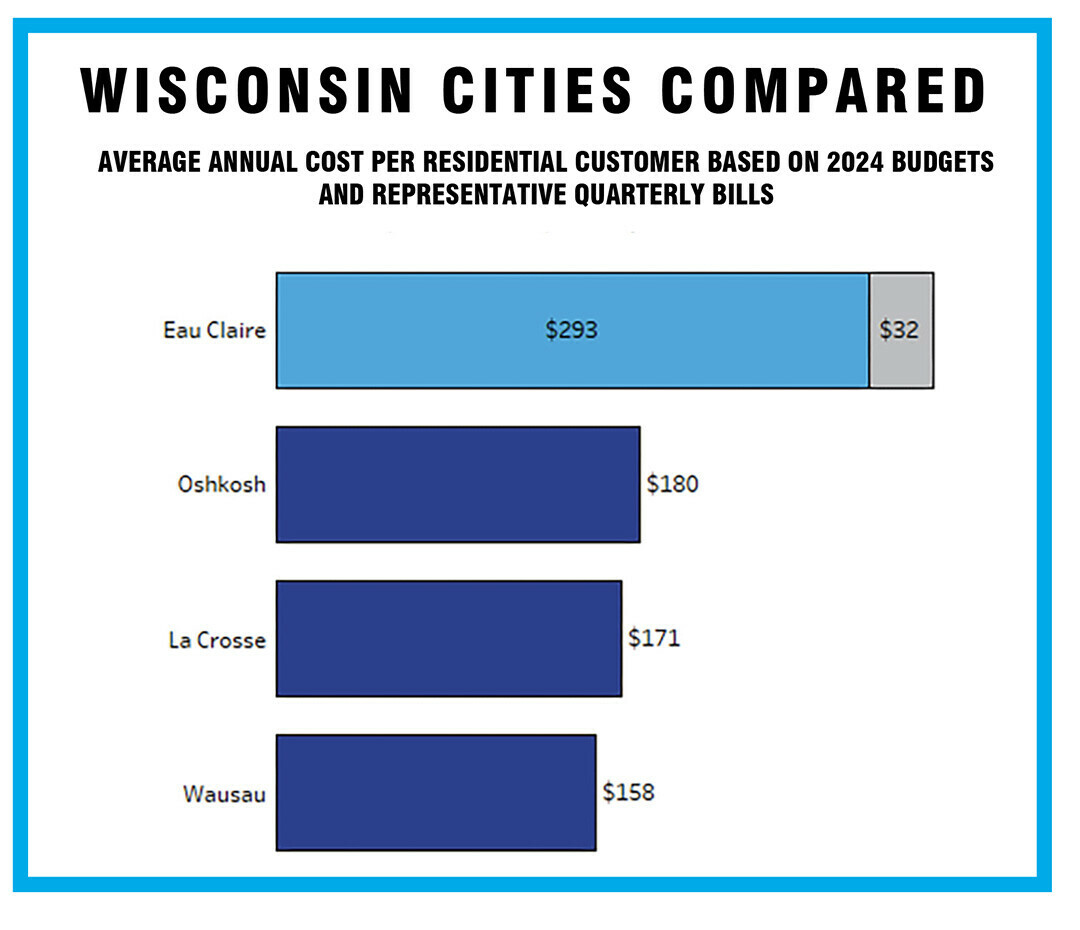TRASH TALK: E.C. Residents Pay a Lot More Than Peers for Garbage Service
study by Wis. Policy Forum suggests possible changes to city’s trash collection system

Eau Claire residents pay more – sometimes nearly twice as much – for trash and recycling collection as people in similar size Wisconsin cities, but the service level they receive is often lower, a newly released study determined.
The average residential customer in Eau Claire pays $325 annually for garbage and recycling service, compared with $180 in Oshkosh, $171 in La Crosse, and $158 in Wausau, according to a report compiled by the Wisconsin Policy Forum at the request of the City of Eau Claire.
After garbage collection delays caused consternation in Eau Claire in 2022, the city hired the Wisconsin Policy Forum – a nonpartisan, statewide research group – last year to conduct an independent review of Eau Claire’s approach to handling its trash. The study resulted in a 25-page report that was officially unveiled on Thursday, Sept. 19. The study will be the subject of a public presentation on Thursday, Sept. 26, at Eau Claire City Hall.

While the report, primarily authored by Wisconsin Policy Forum researcher Tyler Byrnes, doesn’t pinpoint a specific cause for Eau Claire’s comparatively costly trash pickup, it does emphasize that the city is “unique among Wisconsin cities of similar size” because it requires homeowners to contract with competing trash haulers directly for garbage and recycling collection. “The city has used this model for most of its history,” the report states, “and officials indicate it has provided a high level of service for years.”
Currently, four waste haulers are licensed to serve city residents: GFL Environmental, Waste Management, Trash on Trucks, and Earthbound Environmental. According to the report, GFL serves about 13,500 residential customers in Eau Claire, or 55% of the total, while Waste Management has 8,000 customers, or about 33%. Trash on Trucks has about 2,000 customer, or 8%, while Earthbound has an estimated 1,000 customers, or 4% (although Earthbound declined to take part in the study).
How Cities Compare
In contrast to Eau Claire’s “open market” system, in most Wisconsin cities comparable in size to Eau Claire, trash and recycling services are provided by city staff using city-owned trucks. This is the case in Oshkosh, where residents pay a $180 garbage collection fee at the same time as they pay their property taxes. In Oshkosh, trash is collected weekly while recyclables are only collected every two weeks – a fact that could explain some of the cost difference. Oshkosh also is part of a three-county landfill partnership, which lowers costs to municipalities. In addition, Oshkosh offers free, monthly brush pickup between April and December. By contrast, Eau Claire’s trash haulers – with the exception of Earthbound Environmental – no longer offer yard waste collection.
Meanwhile, the cities of La Crosse and Wausau both use a single private vendor for trash collection, and in both cases the service is funded through city taxes rather than a separate fee or bill. These two cities, the report states, “appear to provide similar services as the haulers in Eau Claire at a lower estimated cost per customer, though our cost estimates are imprecise.”
A Different Model?
“While our analysis suggests that shifting to another model may improve services and reduce costs for Eau Claire residents, it would be wise to proceed with caution, as there are challenges and potential pitfalls with changing to either in-house garbage and recycling services or contracting with a single hauler,” the report continues, before outlining four possible approaches the city could take.
Tweaking the current system. The City of Eau Claire could stick with its current “open market” model with some changes to improve efficiency, such as shifting to biweekly recycling, allowing stand-alone compost service providers, requiring trash haulers to pick up large items periodically, and requiring haulers to prepare contingency plans for when services are disrupted.
Choosing a single hauler with private contracts. Another option would be for the city to choose a single trash hauler, but require that homeowners contract directly with the hauler, rather than doing it on their behalf. While this could save money, it could increase complexity and reduce choices for consumers.
City contracts with one hauler. Like La Crosse and Wausau, the City of Eau Claire could sign a contract with a single hauler to serve the whole city. This also could reduce costs, but it would also reduce competition and could spell the end for smaller, locally-owned trash haulers.
City-owned waste hauling. Adopting the “in-house” model followed by cities like Oshkosh would provide the greatest level of control for the city and likely provide savings to residents, but it would require a big upfront investment to hire 10-15 city employees and buy about nine trucks (which could cost around $3.6 million).
The report concludes that “Shifts in the waste hauling landscape, labor market, and conditions in Eau Claire suggest the time might be ripe to adjust how city residents dispose of their household waste. Ultimately, city leaders need to weigh the benefits of continuity and consumer choice interests against possible elevated costs for city residents and limited city control over a vital service.”
`
Read the full report from the Wisconsin Policy Forum here. The public input session about trash hauling in the city will be at 6pm Thursday, Sept. 26, in the North Conference Room at City Hall, 203 S. Farwell St., Eau Claire.


















